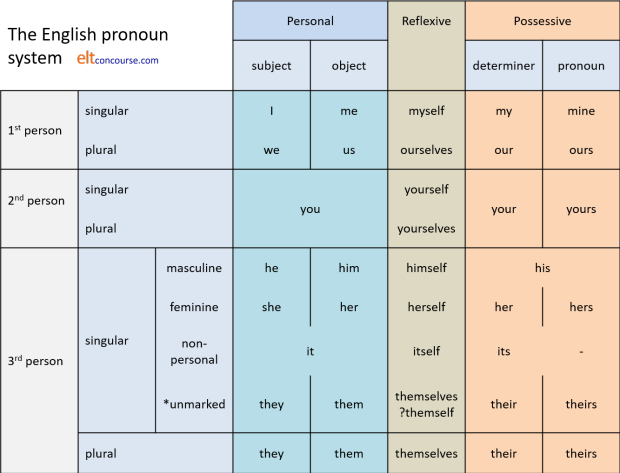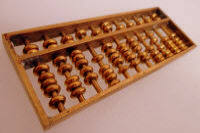Pronouns
Examples in red on this page are wrong.
Pronouns in English are words which stand for other words.
For example:
We can say:
- John came in and he sat
by the fire
John and he are the same person: John = he - The car broke down and we took
it to the garage
The car and it are the same thing: the car = it - I spoke to all the people I met at the party and
everyone was very nice to me
all the people and everyone are the same: all the people = everyone - A: Have you seen my glasses?
B: They are on the kitchen table
my glasses and they are the same thing: my glasses = they
Usually, pronouns stand for something that came before, like
this:

But sometimes they can stand for something which comes afterwards,
like this:

 |
Case in English |
Notice that in the first sentence, the pronoun
they stands for the
glasses.
In the second sentence, it is the word
them that is the pronoun.
This is because in the first sentence the pronoun is the
subject and in the second sentence, the pronoun is the
object of the verb.
English only has three cases: subject, object and possessive.
Many languages (yours?) have more. Some have lots more.
Read the section on verbs
to understand more about objects and subjects.
 |
Personal pronounsThere are three main types of personal pronouns |
 |
Object and Subject |
|
John looked at Paris He looked at it |
These look like this:
| subject | object | |||
| 1st person | singular | I | me | |
| plural | we | us | ||
| 2nd person | singular | you | ||
| plural | ||||
| 3rd person | singular | masculine | he | him |
| feminine | she | her | ||
| neuter | it | |||
| plural | they | them | ||
Examples:
- Subject pronouns:
- First person singular:
I answered his question
Here, I is the subject of the verb answer.
First person plural:
I met two friends and we went to the cinema
Here, we stands for I and two friends and is the subject of the verb go. - Second person singular:
John came in and he spoke to Mary
She told John to go away
It became a nasty argument
Here he, she and it are all the subjects of the verbs speak, tell and become.
Second person plural:
John and Mary sat together and they talked
Here, they stands for John and Mary and is the subject of the verb talk.
In English, they is used for everyone. It doesn't matter if it means more than one woman, more than one man or more than one thing. It's always they. - Third person singular:
You didn't answer the telephone
Here, you is subject of the verb answer.
Third person plural:
I came to the house but you were both out
Here, you stands for more than one person and is the subject of the verb be.
In English, there is no difference between you singular and you plural. In most languages there is a difference. What happens in your language?
- First person singular:
- Object pronouns:
- First person singular:
John answered me
Here, me is the object of the verb answer.
First person plural:
John told us
Here, us is the object of the verb tell. - Second person singular:
John gave her a car
Mary thanked him but she sold it
Here her is the object of give, him is the object of thank and it is the object of sell. Notice that the subject and the object for things is it. It doesn't change in English. - Third person singular:
Mary told you
Here, you is the object of tell.
Third person plural:
Mary told you and you both know now
Here you is the object of tell.
Notice that you never changes the subject, object, singular and plural are all you. That is different in many languages.
English also makes no difference between people you know well and strangers. In many languages the words for you are different.
- First person singular:
 |
Possessives |
|
The squirrel's food Its food |
There are also two groups of these. Some come before the noun (they are determiners) and some stand for the noun (they are real pronouns):
| determiner | pronoun |
| my | mine |
| our | ours |
| your | yours |
| his | |
| her | hers |
| its | |
| their | theirs |
- The difference between the two columns:
- In the first column, the words are determiners. They describe
other nouns in some way just like words like the, some and
that do. For example:
I ate some bread
I ate her bread
I stole the money
I stole their money
and so on. The words in the first column are sometimes called possessive adjectives but that is a little old fashioned. - In the second column, the words can stand as nouns (pronouns).
For example:
My coat is here, hers isn't
Their car is bigger than mine
We can replace possessive pronouns by the noun with the possessive determiner so mine = my car, hers = her coat etc.
For example:
My work is finished but her work / hers is not started.
Their house is bigger than our house / ours.
These words are possessive pronouns or nominal possessives.
- In the first column, the words are determiners. They describe
other nouns in some way just like words like the, some and
that do. For example:
- The word its is only a determiner, not a pronoun. We can say:
What's wrong with the table?
Its leg is loose
but not
Which leg is loose?
Its
That is wrong. - Notice that his is both a possessive
determiner and a
possessive pronoun
It is his book
It is his
 |
Reflexive pronouns |
| He took a picture of himself |
| First person | singular | myself |
| plural | ourselves | |
| Second person | singular | yourself |
| plural | yourselves | |
| Third person | masculine | himself |
| feminine | herself | |
| non-personal | itself | |
| plural | themselves |
Notes:
- These pronouns refer to the same thing. We do not say, for
example:
I wrote me a note
That's wrong.
but
I wrote myself a note
When the object and the subject are the same, we use a reflexive pronoun. - English does not use many reflexive verbs. We don't, for example,
meet ourselves (as we do in German), remember ourselves
(as we do in many languages) or (usually) wash ourselves.
However, we can make many verbs reflexive if we want to:
I poured myself a drink
She drove herself home
etc. - This is the only area where English makes a difference between you plural and you singular: yourself (singular); yourselves (plural).
Here's a summary as a graphic so you can save or print it out easily.

Adapted from
Quirk, R & Greenbaum, S, 1973, A University Grammar of English,
Harlow: Longman
(page 102) with additions.
 |
Other pronouns |
| Something in the window |
There are also some pronouns which do not stand for particular, special people or things.
There are lots of these and this is a simple grammar so this part is short. To understand it, you must know the difference between mass and count nouns. Read the section on nouns for that.
- Relative pronouns

Here are some examples:- The car
which
had the accident is in the garage (which
stands for the car)
The man whose wallet you found is coming to collect it (whose stands for the man's)
The people who came to the party (who stands for the people)
That's the car that he sold (that stands for the car)
- The car
which
had the accident is in the garage (which
stands for the car)
- Interrogative (question) pronouns

These look the same as the relative pronouns but make questions. For example- Who came to the
meeting? (pronoun usually for people only)
Which is your jacket? (pronoun for objects, used when you can choose from a number of things)
What do you think? (pronoun in the same meaning but used when there is no selection)
Whose hat is this? (possessive pronoun)
- Who came to the
meeting? (pronoun usually for people only)
- Demonstrative pronouns

There are only 4 of these: this, that, these, those.
They are different for plural and singular things and things close to us or far away.
Here are some examples:- This is my boss, Mary
(singular, here)
These are the people I like (plural, here)
Those are my friends (plural, there)
That is her husband (singular, there)
- This is my boss, Mary
(singular, here)
- Universal pronouns

These are: everyone, everybody, each, everything, all. Here are some examples:- Everyone/ Everybody is coming (these can only be used for
people)
We have all the plates and all the food (all can be used for count and mass nouns)
Every window is broken (every can only be used in the singular)
Every windows are broken is wrong. it should be All the windows are broken
- Everyone/ Everybody is coming (these can only be used for
people)
- Count pronouns

These are used instead of count nouns. For example:- I don't have
many
I have a few
I have several
I want more (this pronoun is used for both mass and count nouns)
- I don't have
many
- Mass pronouns

These are used instead of mass nouns. For example:- I don't have
much
I have some
I have a little
I want more (this pronoun is used for both mass and count nouns)
- I don't have
much
- The some- and
any- series

These go together with -thing-, -body, -one and -where to make words like anything, somebody, anyone, somewhere, anywhere etc. These words are always singular.- Usually, we use some in positive statements and
any in questions and negatives:
Positive Negative Question I have some time I don't have any time Do you have any time? I have something to say I don't have anything to say Do you have anything to say? Someone is at the door There isn't anyone here Did you see anyone? It is here somewhere I haven't been anywhere Is there anywhere nice to visit? - But be careful! Sometimes a question is not really a
question! For example:
Do you have anything to eat?
is a real question and we use anything but
Do you want something to eat?
is not a question, it's an offer, so we use something.
- Usually, we use some in positive statements and
any in questions and negatives:
- Negative pronouns

These are nobody, no-one, nothing, neither, none. Here are some examples:- Nobody came (people only)
No-one won the prize (people only)
Nothing was there (things only, mass nouns only)
I asked all my friends but none came (things and people, count and mass nouns)
I wanted a beer but none was in the fridge (things and people, count and mass nouns)
I wanted milk but none was in the bottle (things and people, count and mass nouns)
I asked my two brothers but neither came (two things or people, count and mass nouns)
There were two red shirts but neither was in my size (two things or people, count and mass nouns)
- Nobody came (people only)
- One

This pronoun can be singular and plural. We use it like this:- Some girls were in the classroom but I only spoke to the
older one
He offered me all of them and I took the blue ones
He offered me all of them and I took the blue one
- Some girls were in the classroom but I only spoke to the
older one
